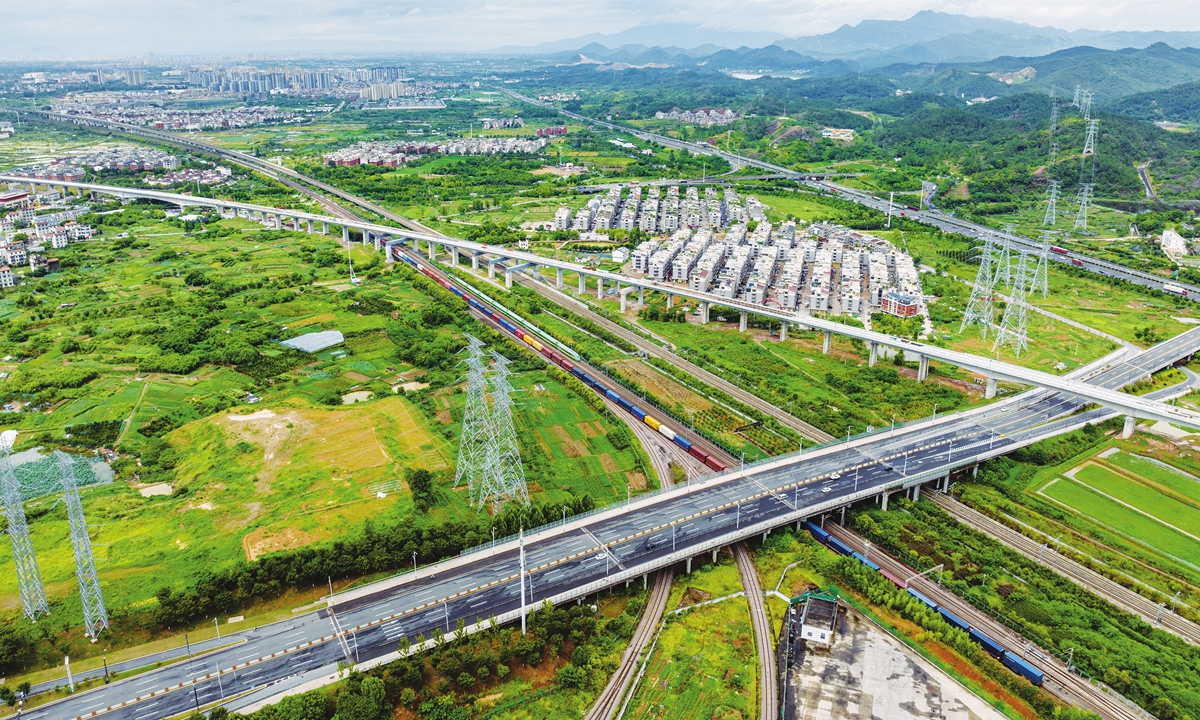
A China-Europe freight train departed from the city of Yiwu in east China's Zhejiang Province for Madrid, Spain, on July 29, 2023. Photo: VCG
Editor's Note:This year marks the 10th anniversary of the Belt and Road Initiative (BRI) proposed by Chinese President Xi Jinping. Through the lens of foreign pundits, we take a look at 10 years of the BRI - how it achieves win-win cooperation between China and participating countries of the BRI and how it has given the people of these countries a sense of fulfillment.
Being the western end of the ancient Silk Roads, Spain has long historical connections with China. Xulio Rios (Rios), a Spanish scholar on China and emeritus advisor of the Observatory of Chinese Politics in Spain, shared his insights on what is happening in Europe surrounding the BRI with Global Times (GT) reporters Xu Hailin and Qian Jiayin.
This is the 15th piece of the series.
GT: What progress do you think the BRI has made globally?
Rios: I believe it has been very significant, especially for two qualitative reasons. The first reason is that it has offered an alternative to many developing countries, particularly in addressing their most pressing needs in certain areas. The second is that it has established a contextual framework for China's investments abroad, transcending the purely economic to encompass other domains, from cultural to digital, for example. It has also allowed China to refine its economic diplomacy, gain a more accurate understanding of the various challenges it faces, and progressively improve its governance. All of this provides a catalog of lessons that can make the project more efficient, benefiting both China and other countries and regions involved.
GT: Although a significant amount of progress has been made, there are still many discordant voices about the BRI. What do you think of the current status and future of the development of the BRI?
Rios: I believe that, first and foremost, all voices deserve to be heard. Undoubtedly, there will always be room for improvement. At present, the BRI serves as a benchmark for China's diplomatic actions, enhancing its global role and status. Its implementation has had to face two types of challenges. The first relates to the initiative itself, whose path must accommodate protocols and evolving models. The second involves external challenges, such as the COVID-19 pandemic or the Ukraine crisis and its effects. This highlights an exceptional period that, far from discouraging, underscores the importance of these processes. There may be ups and downs, even setbacks, but the essence of the BRI will continue to evolve. It will continue adapting to China's current internal moment, which represents a crucial turning point in its development model.
GT: How does the BRI reflect China's role in global development and global governance? Do you think this role of China should be more valued by the international community?
Rios: I believe that the international community should, first and foremost, be glad to have a new global actor committed to fostering development, cooperating in the fight against poverty and promoting a more sustainable economy. China's development shows that it is not just any actor; it possesses tremendous potential. Some view this primarily not as a positive development but as competitive, leading to competition and sometimes hostility instead of cooperation. However, China's commitment to global development is both conceptual and historical. It has deep roots and now has more resources to engage further. China has been upholding the combination of peace and development; it's not a recent inspiration. With the BRI and its associated institutions and processes, China's influence will continue to grow, so will its role in multilateral organizations. The organizations it promotes can also experience great success. This takes time, and it also needs ongoing analysis as well as a willingness to continuously improve, always in dialogue with other countries to facilitate understanding and dispel any unfounded criticism or suspicions associated with neo-imperial or hegemonic intentions.
GT: 2023 will be the 50th anniversary of the establishment of diplomatic relations between China and Spain, and China is currently Spain's largest trading partner outside the EU. Will the BRI bring more development potential to China-Spain cooperation?
Rios: Spain has an ambiguous stance regarding the BRI. On the one hand, it celebrates the involvement, as seen in the Yiwu-Madrid freight train, but on the other hand, it avoids signing the MOU to formally join the initiative. Spain wants the associated benefits without the "price" of a formal commitment that could be interpreted as expressing ambiguity in its foreign policy. Currently, the prevailing sentiment in the EU is a call to align with the US, which Spain supports, keeping a distance from China. This attitude doesn't help maximize the potential of bilateral cooperation, although it remains generally good. However, even without formal coverage, triangular projects associated with the BRI could be of interest.
GT: What do you think about the development prospects of the BRI in Europe? What benefits can European countries gain from participating in the BRI?
Rios: There is no unanimity in Europe. Undoubtedly, countries in greater need of capital and investments would like greater involvement in the BRI. However, others view it with suspicion. Therefore, it is important to continue emphasizing dialogue and create mechanisms that help build trust, establish synergies and address doubts from a strategic perspective. In the current state of the European economy, cooperation with China remains essential, and efforts should be made to avoid widening divisions or "wars" - such as the recent and emerging electric vehicle conflict - that exacerbate disagreements.
GT: Italy has reportedly claimed to withdraw from the BRI. In your opinion, what's behind this move? Do you think this will affect the confidence of other European countries in participating in the BRI?
Rios: It is widely known that pressures to reverse Italy's decision to join the BRI began from the moment it joined, particularly from across the Atlantic. I don't believe it will trigger a domino effect, although it may affect a few more countries. Italy's decision is more influenced by its G7 membership than its EU status. It reflects a certain state of mind: the failure of strategic autonomy on one side, as it never progressed beyond a mere and fleeting desire, and European paralysis and confusion regarding relations with China amid an ongoing debate.
GT: You previously stated that some developed countries are not welcoming the contributions of the BRI. What do you think is the underlying reason for Western countries having concerns about the development of the BRI?
Rios: There is a persistent campaign of criticism, including accusations of debt traps, subjugation of needy countries, corruption promotion, commitment breaches, wastefulness and project neglect. It is important to maintain an objective and balanced assessment, avoiding both outright criticism and unqualified praise as if everything were perfect.
Some see China less as a complement and more as a rival capable of displacing Western influence and challenging the global liberal leadership. China extending its presence and influence in certain geopolitical spaces, offering an alternative model, and achieving success all add up to a challenge to traditional Western hegemony. This is not welcomed by some countries. Instead of creating a space commensurate with China's size, obstacles often prevail.
GT: The EU has proposed the Global Gateway initiative, while the US has proposed the Build Back a Better World plan to counter the BRI. The US is also promoting a multinational rail and ports deal linking the Middle East and South Asia. How are they different from the BRI?
Rios: These proposals are aimed at competing with the BRI (on the one hand, there is disapproval, but on the other hand, imitation), and to some extent, obstructing some countries' closer ties with China. Whether these initiatives will materialize and gain genuine support remains to be seen, and there is considerable skepticism among potential beneficiaries. It's not the first time that major announcements have not been empirically followed through. Furthermore, they emphasize meeting certain structural economic needs by advancing along the liberal path, while the BRI adopts a much more comprehensive approach, and this comprehensive approach is more highly valued in some countries, especially when it is formulated as a shared and horizontal, rather than vertical, framework.
GT: Following the US, the EU has also been calling for "de-risking" the Chinese economy. What is your view on this statement? Do you think "de-risking" deviates from multilateralism?
Rios: There are similarities but also nuances in the positions of the US and the EU. Undoubtedly, the US has a more hostile and confrontational stance toward China. The EU, although generally dragged into this dynamic, remains committed to multilateralism. It is understandable that the EU wants to diversify risks and reduce dependencies. However, in doing so, it should be consistent and avoid framing "de-risking" primarily in ideological or generic terms, as if it were synonymous with decoupling. It should also be understood that China wants to reduce risks, for example, in its exposure to the Western-led financial system. Both sides need political will and strategic clarity to opt for constructive adjustments rather than traumatic separations.
The situation in Europe is very volatile, especially if Donald Trump returns to the White House. The EU needs to cooperate with China to ensure its stability and address significant economic, social and institutional challenges in the upcoming period, which presents substantial dangers such as the rise of far-right politics.


